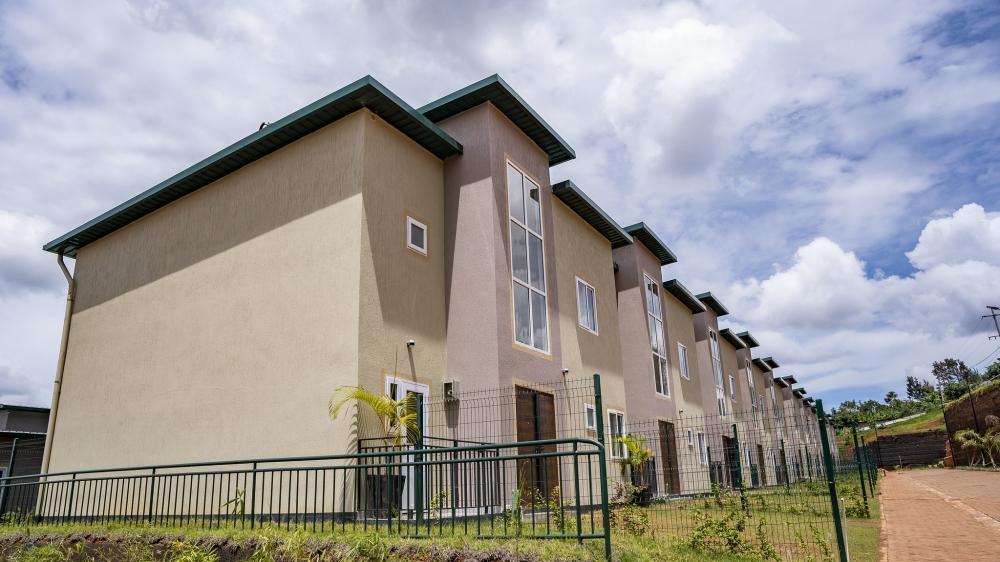Africa-Press – Rwanda. The government of Rwanda aims to make home ownership and renting more affordable through targeted financing, public-private partnerships in construction, and easier access to housing loans, according to the Minister of Infrastructure, Jimmy Gasore.
If implemented effectively, the measures, which are still under consideration, could help close the housing gap and make decent living conditions a reality for more Rwandans.
Gasore shared the proposed plan on Tuesday, November 11, while presenting the 2025 National Urbanisation Policy to Parliament. The goal of the policy is to accelerate the rate of urbanisation and create hubs of inclusive and sustainable growth through well-managed cities, well-coordinated spatial development, and resilient urban infrastructure.
He said that discussions on the three-pronged approach were at Cabinet level.
During the parliamentary session, MP Diogene Bitunguramye raised concerns about investors developing “expensive homes such that you realise houses are expensive for both residents and traders.”
He added that this also contributes to the increase in product costs for consumers. He asked whether there were plans to introduce rent models based on square metres to make housing more affordable.
In response, Gasore explained that direct government intervention in private-sector pricing often produces poor results. Instead, he said, the government intends to enter the market to boost the supply of affordable housing, which would naturally help reduce prices through increased availability.
“We can’t dictate prices to investors who have taken loans to implement their projects,” Gasore said. “But by adding more affordable houses to the market, we expect prices to go down.”
The three-pronged plan Gasore outlined three key areas where the government will intervene to make housing more accessible.
1. Financing:
The government plans to establish a dedicated fund to support the development of affordable housing.
This fund would mobilise financing for both public and private developers to construct low-cost homes.
2. Construction delivery
While the government will not directly build houses, it will partner with private developers to speed up construction and ensure that units are delivered at lower prices.
3. Sales and ownership/rent support
The government plans to facilitate access to housing through affordable loan schemes and by allowing citizens to use existing savings mechanisms, such as EjoHeza, to buy homes, Gasore said.
“The goal is to have many homes that are affordable,” Gasore stated. “The government won’t construct them but will work with the private sector to improve delivery.”
MP Theogene Munyangeyo asked for clarification on how house prices are aligned with citizens’ income levels in line with affordability.
Meanwhile, MP Germaine Mukabalisa raised concerns about rising living costs in areas fast urbanising, such as Kigali and other cities.
“When new projects are developed, residents with low incomes often move away because life becomes expensive,” Mukabalisa said. “What measures are in place to address this risk once the urbanisation policy is implemented?”
Gasore said that the country was putting efforts in rehousing initiative to address unplanned settlements or slums through upgrades in urban areas.
He cited the Mpazi rehousing project in Gitega, Nyarugenge District, indicating that the model – after being successful with 688 housing units completed – is being replicated to Nyabisindu in Gasabo District, where some 1,600 units are planned.
Under such a model, housing units are built for families who voluntarily contribute land for the development of housing, while the remaining units are for developers. The Minister added that this model will be taken to other parts of the country.
“We are putting more efforts in rehousing so that citizens have decent accommodation without being relocated,” Gasore said.
He noted that this approach will also help the country to have more affordable houses and achieve the target to have more than 52 per cent of the population living in cities by 2035 and 70 per cent by 2050.
What’s affordable housing
Rwanda’s affordable housing policy determines that an affordable house should not exceed Rwf40–50 million, with payment spread over 15 to 20 years, if it is on a mortgage.
According to international standards, a house is considered affordable if housing costs do not exceed 30 per cent of a household’s monthly income, whether in rent or mortgage payments, Gasore noted.
A house cannot be considered adequate or accessible if its cost compromises the occupant’s ability to afford food, healthcare, education, and transport, as per the United Nations Human Settlements Programme (UN-Habitat), which underscores the 30 per cent spending cap on house rent or ownership purposes.
Gasore indicated that while this is factored in under the country’s housing plan, generally, affordable houses to be built in Rwanda will be priced between Rwf25 million and Rwf40 million — depending on income category and house type and size.
He underscored that these homes won’t be free but will be sold to people who can afford them. The expectation is that as more affordable homes become available, rental prices will drop, benefiting even those who cannot purchase homes. For affordability purposes, he underscored, rent should not exceed 30 per cent of a tenant’s income.
He also mentioned the possibility of building smaller homes — such as studio or one-room house units — to suit the budgets of some urban residents, citing global trends toward compact, efficient living spaces.
In March 2023, the Ministry of Infrastructure reported that 50.8 per cent of Rwandans were low-income earners, earning not more than Rwf200,000 per month. 46.5 per cent were considered middle-income earners (Rwf200,000–Rwf1.2 million), while 2.7 per cent earned above Rwf1.2 million.
At the time, the government announced plans to invest directly in social rental housing for those earning up to Rwf200,000 per month. It also sought to partner with investors to access low-interest loans, some as low as 1 per cent, from international financiers to support affordable housing schemes.
For More News And Analysis About Rwanda Follow Africa-Press






